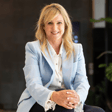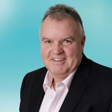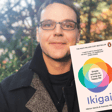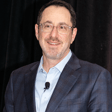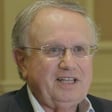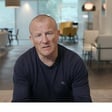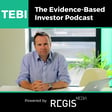Become a Creator today!Start creating today - Share your story with the world!
Start for free
00:00:00
00:00:01

Ep 26: George Kinder on life planning, mindfulness and the need for change in the investing industry
The most enthusiastic advocate of mindfulness I know is George Kinder. George, better known as the father of the financial life planning movement, has practised mindfulness for most of his life and written books about it.
In the latest TEBI Podcast, George explains how mindfulness can help investors achieve better outcomes and live more fulfilled lives.
Transcript
Introduction to Tevi Podcast and Guest George Kinder
00:00:04
Speaker
and welcome to the Tevi Podcast. I'm Robin Powell, the editor of the investing and personal finance blog, The Evidence-Based Investor. This podcast is brought to you by Regis Media, a boutique provider of content and social media management for evidence-based financial advice and planning firms.
00:00:26
Speaker
Our latest guest is George Kinder, one of the most influential people in the global financial advice profession. George is best known as the founder of what's called the Life Planning Movement. Life planners or financial life planners take a very different approach to the traditional product-led approach that's still preferred by most financial advisors today.
George Kinder's Diverse Background
00:00:53
Speaker
George has homes in Hawaii and Massachusetts and describes himself as a poet, spiritual teacher, artist and photographer. He's also a big anglophile and I caught up with him on his latest visit to London.
00:01:10
Speaker
My background in money and in financial services is that I've been in the financial services industry for, gosh, 40, almost 50 years maybe.
What is Life Planning and Its Core Principles?
00:01:22
Speaker
And what I'm known for in the industry, I mean, I was a money manager, I was a tax advisor, all those things. But what I'm known for in the industry is as the father of what's called the life planning movement.
00:01:33
Speaker
And it's a movement that brings a focus, a fiduciary focus to the consumer, to the client, so that it's very clear that the client comes first, not the products, not the profits.
00:01:49
Speaker
It's a transparent relationship. And what I've done is I've trained advisors to have fabulous relationships with the clients and then to build a relationship that's so trustworthy that the client reveals what it is they really want out of life. And often that's a surprise to the client as much as it is to the advisor. And then the advisor devises the financial program to make sure that it happens.
00:02:18
Speaker
Now, the role you described there is very different to the role of, let's face it, most financial advisors and planners around the world. Why do you think there is that big gap between what you're recommending, you know, life planning and, you know, run-of-the-mill, if I could call it that, financial advice?
00:02:37
Speaker
It's very clear all the power and all the money in the industry is in the product companies and what we think of as service providers so that that money is geared toward profit. It's geared toward selling things and making profits that then in many very good ways come back to investors.
00:03:03
Speaker
But the focus in relation to money should be on the client's freedom. Number one, absolutely on the client's freedom. And that's what we've trained advisors in the life planning movement to do.
00:03:13
Speaker
What would you say to people who'd say, I just want to invest, George. I don't need any of this life planning business. What would you say to them?
Building Trust in Advisor-Client Relationships
00:03:22
Speaker
Well, I think that we all feel that. And part of the reason that that's happening is that you have that kind of response, is that clients in general don't trust, people don't trust financial advisors.
00:03:35
Speaker
So they think that any attempt at a genuine relationship between themselves and an advisor is likely to be manipulative, is likely to be aimed at the profit of the advisor. So what I think the truth is, is if I was talking to a consumer, I'd say, don't you want to live a life of freedom? Don't you want to live a life that fulfills, that brings you to the greatest vitality, to the greatest passion, to the greatest meaning?
00:04:03
Speaker
and the greatest accomplishments that you can experience in your life. And if that's so, wouldn't it be good to have someone who really is exceptional at listening so that they actually, and engaging with you and supporting you around those endeavors.
00:04:20
Speaker
I suppose it boils down to finding someone you really, really can trust. And it clearly has the sorts of skills that you train your advisors in. But it's actually quite hard to find somebody who we really trust. How would you recommend people go about that?
00:04:39
Speaker
Well, we have a website that has hundreds of advisors from England on it, thousands of advisors all over the world.
Skills of a Registered Life Planner
00:04:49
Speaker
The best trained advisors that we know of are registered life planners, and there are dozens of those all through England, all over England, I think probably over a hundred.
00:05:03
Speaker
So they are advisors who are trained to listen really well, they're trained in empathy, they're trained in relationship skills, but more than anything else they're trained to put the client's dreams of freedom first and to use all of their financial skills to deliver the clients into those dreams of freedom. So what sorts of questions should you be asking a potential advisor to make sure that you're not getting the kind of financial salesman type?
00:05:32
Speaker
I think there are a couple of things. If you really want to be careful about the financial salesman type, you'd want to find out to what extent they get money paid for by product companies, and you'd want to minimize that, so there's virtually none. The other thing really is, have they been trained as a registered life planner in listening skills? I think that would be the main thing.
00:06:01
Speaker
Say to the suggestion that financial advisors, I mean I know you call them financial planners and live planners specifically, but some people might say financial advisors should be dealing with financial matters. For all these other things you should be talking to, I don't know, a counsellor or a minister of religion or a spiritual mentor if you like. What do you say to that?
00:06:23
Speaker
Well, I think that most people, when they think about a financial advisor just having to do with financial matters, they're actually the ripest candidates for being taken advantage of because the people that just pay attention to finance and don't really care about you, don't really listen to you, aren't concerned about your issues, are going to be salespeople.
00:06:43
Speaker
They're going to be selling you on products or services. Their main aim is making a profit for their own business. They don't have a passionate concern about delivering you into freedom. So if that's what you want, then you're pretty much asking for the potential of trouble down the line.
00:07:03
Speaker
You're also a big fan of mindfulness. So how did all that start? And why do you think mindfulness is so powerful?
The Role of Mindfulness in Finance
00:07:13
Speaker
Yeah, mindfulness is, I love mindfulness. As you know, I've done it for 50 years and I've done it, and I do it a lot. Right now I'm doing it probably several hours a day. I just love it. But what it does for, what it really is about, what people don't realize, and people think it's meditation. Well, yeah, it's meditation. But what it really is, is listening.
00:07:34
Speaker
So you're paying attention. So it's a training in paying attention. And you're paying attention in here. You're paying attention in a way to who you are. So you're paying attention to these moments where you feel wonderful, these moments where you feel frustrated, these moments where you feel fearful or anxious or guilty or shameful.
00:07:58
Speaker
which we all have as human beings. And you might go, well, what's the point of that? Well, the point of it is is that if you're if you've trained yourself to listen that well inside of yourself, you're going to be much more empathic toward a client who's feeling anxiety, who's feeling frustrated, who's feeling angry or feeling guilty or feeling confused. You're going to be much more there for them because you've trained yourself to listen quietly inside yourself first.
00:08:28
Speaker
There's a guy called Andy Puddlecombe who's quite well known here in the UK and he's written various books about this subject. He talks about meditating for hours on end and the question that I want to ask him and you, how do you get any work done?
00:08:46
Speaker
Well, to me, what's important is to put first things first. I've always felt that meditation was going to make me a better person. It does multiple things, and several of them mean that I work much more efficiently. For instance, the primary practice that is taught in mindfulness is to really focus on the present moment.
00:09:12
Speaker
which, as you know, it's impossible to do because it keeps disappearing on you. But what that does is that it makes you much quicker in a moment, much clearer in the moment, much more capable at a moment's notice to focus and be present. So you're really much more alert. There's a wonderful study. There's so many studies now, scientific studies about mindfulness. One of the ones I love for my 15-year-old daughters is I tell them mindfulness will make you smarter.
00:09:43
Speaker
There's an incredible study of these students who are in high school in America who are in college, and they're looking to go to university after college. They do a course for six weeks in mindfulness. It turns out that their test scores are tested just before they do the course.
00:10:05
Speaker
and just after and they go up by anywhere from 15 to 30 percent just from six weeks of the course. It's astonishing you know you wonder why is that happening. I think it's pretty clear why it's happening because what's happening is that you're in mindfulness you're constantly coming back to the present moment so you're challenging yourself really to be right here.
00:10:26
Speaker
So in addition to these listening skills and being more emotionally aware with a client, you're toe to toe with them. You're alert and present. So I think that I work much more efficiently because of that. So how does mindfulness specifically help investors?
00:10:46
Speaker
Well, it will mean that you don't go crazy with greed or with fear at the very worst moments. As we know, the most common pattern in investing
00:11:04
Speaker
is not to buy low and sell high, which is the smartest thing to do. The most common pattern in investing is that we all buy high when everybody's enthusiastic about something, and then we sell low when everybody's pessimistic about something. So what happens, that's driven by greed and fear. What mindfulness does is it creates more patience, more equanimity,
00:11:29
Speaker
more quietness, less reactivity, so you're more able to be here, be present. And as you know George, one of the big obstacles to a successful investment experience is actually reacting to events. Absolutely. Our natural inclination to want to do something. So from a mindfulness aspect then, what would your recommendation be to people who
00:11:55
Speaker
anxious about the markets. Maybe markets are falling heavily and they're watching the value of their portfolio go down. What should they be doing from a mindfulness perspective?
00:12:06
Speaker
I don't know if mindfulness is the right tool exactly in the moment because mindfulness is something that builds over time. There are incredible studies. There's a wonderful book called Altered States, which is a survey of thousands of scientific studies of mindfulness.
00:12:27
Speaker
And what it's really talking about is how we build inside ourselves these qualities of patience, of kindness, of generosity, of focus, of concentration by the amount of time over a lifetime that we have meditated.
00:12:44
Speaker
just a little bit of meditation as was expressed in this example of just six weeks. And test scores can help tremendously. So my main recommendation would be to, if you aren't doing mindfulness, get a practice going. And if you are, I would double your practice time.
00:13:03
Speaker
And I think the third thing is find an advisor who's trustworthy because they will help settle you down. They have listening skills inside of them and they'll help settle you down so you don't make foolish mistakes. I remember making a bit of a foolish mistake a while ago
00:13:25
Speaker
and investing quite a lot of money just before the markets went down very sharply, getting in a real state emotionally and blaming myself and actually turning to a book by Eckhart Tolley, The Power of Now, I think it was, which I find helpful. Are there any other books that you would particularly recommend people try?
00:13:54
Speaker
Yeah, well, I'm very partial to my own. Go on, mention those, George, mention those. So I've written two books really explicitly about mindfulness. One, Just Mindfulness Practice. It's a secular book. It's got about 80 different practices in it. And it's called Transforming Suffering into Wisdom. So it would have been very helpful for you.
00:14:18
Speaker
And it's written in these very simple one page to two pages or a chapter. So you can really read it, put it aside, reflect, and do a little meditation and gain a great deal from it.
Books and Mindfulness Practices by George Kinder
00:14:30
Speaker
And the other one is the one that I've just finished, which is really in regard to all this turmoil we find ourselves in in civilization, both coming out of the banking crisis and then coming out of these challenges to our democratic systems across the Western world. And it's called a golden civilization and the map of mindfulness. And in there I actually talk about how do we bring
00:14:54
Speaker
mindfulness practice to bear on the structures and systems that have led us into this turmoil that we find ourselves in in civilization and how can we actually create in relatively short order a civilization that is thriving and sustainable and just amazing with freedom. I mean a structure, an industry that you're very familiar with is the asset management
00:15:20
Speaker
Industry, which is it itself going through a period of turmoil at the moment?
Integrity in the Financial Industry
00:15:25
Speaker
Is there anything that that industry can learn from the kinds of things you're saying? Well, I I'm in a way I'm going toward a zero tolerance place I've been in the industry for almost 40 years 50 years and I
00:15:46
Speaker
And I entered the industry thinking that, gosh, I might be able to make a difference. When the banking crisis hit in 2008, I was personally devastated because I thought, I questioned everything that I'd done. What have I been doing for 40 years? How could this be happening? I think it's time for people on the product side and people on the advice side to really reflect
00:16:16
Speaker
and determine that corruption is not acceptable, that there ought to be much higher price paid for it, that there should be an absolute fierce wall between advice and products.
00:16:32
Speaker
between advice and large institutions, and between our regulators and large institutions. So we need an integrity that is impeccable if we were to have a civilization that will thrive. Just one image, if I may, from this. It's just amazing. You know the Cassini satellite? Yes, yes. So it goes out. It goes all the way to Saturn's rings. It's so amazing.
00:16:57
Speaker
And it sends back these images to us. Well, if that satellite were off by even a couple of inches for every mile that it goes, would it get to Saturn's rings? No. No. So NASA has a term for that impeccability of trajectory, of aim. Do you know what the term is? No. Zero tolerance or? Close. It's integrity. Integrity, yeah.
00:17:28
Speaker
The integrity of their systems is impeccable. That it's time for us to no longer settle for, well, yeah, you can sell product and give advice. I don't think so. We need people to be completely on the side of the consumer. And it's time to make that integrity the number one thing in the industry.
00:17:50
Speaker
Final question, George, because I know you're busy on that same subject. Are you optimistic that we're moving to a financial industry with more integrity? I mean, yes, we are seeing some headway being made, but at the same time, it seems sometimes to be two steps forward and one step back. What's your view on that?
Optimism for Change in Finance
00:18:12
Speaker
I think it's probably two steps forward and two steps back we're seeing and we keep seeing changes that are for the good and then we see advantages that are taken in places we hadn't imagined and I think that the more complex our systems are when they're getting more complex all the time because we're so brilliant as creatures that until we actually institute a way of bringing good heart
00:18:34
Speaker
and great integrity and a fiduciary relationship that is sustainable into the industry that we are going to fail as an industry. It will not hold. That said, I'm enormously optimistic. And the reason that I'm optimistic is we can't do it any other way. We have to make this change and we have to make it now.
00:19:02
Speaker
George, it's good to end on a positive note. Thank you so much for your time. Good luck with the book, and you're going on a world tour, pretty much, aren't you, talking about your book? Yes, the book, The Golden Civilization and the Map of Mindfulness. I'm excited about it all over the world. Thank you very much, George Kinder.
00:19:20
Speaker
Well, that's about it for this episode of the Tebbe podcast.
Conclusion and Additional Resources
00:19:25
Speaker
You've been listening to me, Robin Powell. As always, this programme has been brought to you by Regis Media. You can find out more about Regis Media and the work it does with financial advice firms around the world by visiting the website, Regis, that's Regis with an I, RegisMedia.com, RegisMedia.com.
00:19:47
Speaker
If you've not discovered our blog yet, you'll find it at evidenceinvestor.com. That's evidenceinvestor.com. We're also on Twitter, Facebook, Instagram, LinkedIn, and of course on YouTube. My thanks again to George Kinder, to our producer James Creswell, but most of all to you for listening. Until next time,


